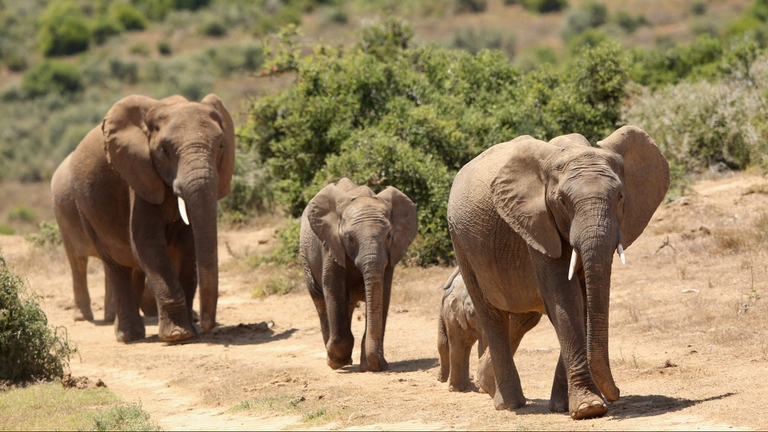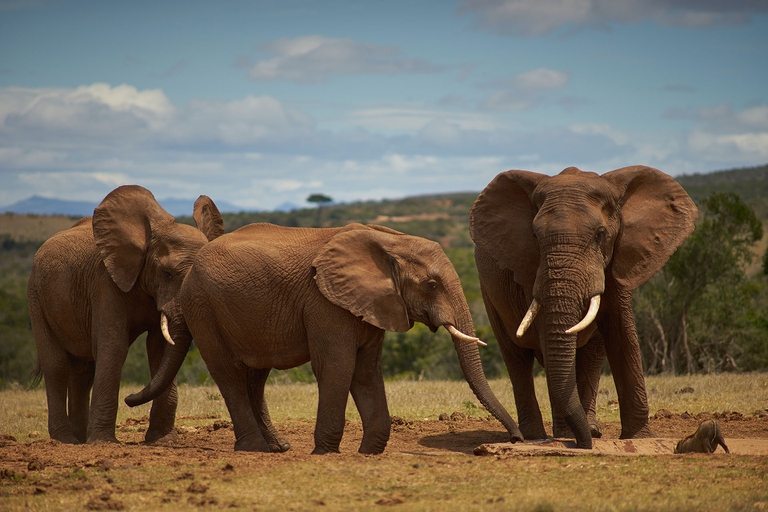https://www.lifegate.it/elefanti-africani-si-chiamano-per-nome
- |
The African elephants (Loxodonta Africana) possess one of the most enigmatic minds of our planet.Their enormous brains, weighing around four and a half kilos, are equipped with neurons three times more numerous than those of our species.
For a very long time, male African elephants were considered solitary animals leading wandering existences.Thanks to field research, over the years we have learned that these animals are much more social than previously assumed.They know each other individually and form subtle coalitions, which suggests that the society of pachyderms is just as complex as that of other political animals.
The interactions of elephants clearly show that they they understand what they are saying.They are able to make refined distinctions concerning potential enemies, such as bees or humans, to the point of classify our species based on language, age and gender.To the ear of a fellow elephant, a trumpeting elephant can provide a very specific message.Apparently these enormous animals are even capable of calling each other by name.
Family reunions
Second Michael Pardo And George Wittemyer, authors of study “African savannah elephants call one another by ‘name’”, published in the magazine Nature ecology & evolution, African elephants address their family members with specific, name-like calls.
The two researchers from the University of Colorado thus questioned another, yet another, characteristic that we believed to be the prerogative of our species.In fact, it was believed that the use of proper names was exclusive to humans.Other animals, such as bottlenose dolphins (Tursiops truncatus) and i orange-fronted parakeets (Eupsittula canicularis), target specific individuals by imitating the recipient's call.Elephants, however, would be capable of using arbitrary speech labels, independent of any sounds emitted by the listener.What, to all intents and purposes, we could define as a "name".

What are elephants called?
The researchers analyzed 469 recalls, emitted by 101 recorded African elephants in two parks of Kenya, to try to identify the subtle differences between the vocalizations emitted, and find confirmation to Pardo's intuition, convinced that pachyderms, by virtue of their extensive vocal communication and sophisticated social relationships, could call each other by name.
There is much more sophistication in the lives of animals than we normally think.Elephant communication may be even more complex than we have previously thought.
Elephants use to call themselves a combination of vocalizations and growls, some of which human hearing is unable to perceive, and apparently indistinguishable from other more generic calls, which researchers were able to identify and isolate thanks to the use ofartificial intelligence, trained to recognize the slightest variations in frequency and pitch in elephant calls and thus predict the recipient of the call.
By analyzing the recorded calls, the researchers were able to identify specific vocalisations, which differ from generic calls addressed to the whole group, but addressed to very specific individuals.The model used correctly identified which elephant was being called 27.5 percent of the time, suggesting that such calls they convey information intended only for a specific elephant.

Replying is courtesy
This finding indicates that the calls emitted by elephants contain a component that identifies the specific recipient to whom the communication is directed.Through field observations, the study authors deduced that elephants are capable of recognize your own “name” and respond to calls.In fact, they observed that by making the elephants listen to different recordings, some originally addressed to them and others addressed instead to other pachyderms, the animals approached more quickly if their name was broadcast, and produced vocalizations in response.“This indicates that elephants can tell whether a call is aimed at them simply by listening to it,” commented Pardo.
Through the algorithm used, the scholars also observed that the calls issued by the same elephant to the same recipient were more similar than those from the same caller to different recipients.This suggests that, to address a specific individual, elephants use the same name, albeit with some slight variations.
Shedding light on the evolution of language
Elephants and primates they diverged over ninety million years ago, yet these recent discoveries suggest that they may exist similarities in the way of communicating.The need to address conspecifics as individuals, the study authors hypothesize, may have been an important factor selective pressure on evolution of vocal learning.Such abilities also have implications for the scope of elephant cognition, as addressing each other with specific vocal labels suggests symbolic thinking ability.
In any case, the results of the study need to be clarified additions and further insights, since the data used are numerically scarce.However, studying elephant communication can help us understand how human language evolved and to shed light on the still largely obscure world of animal cognition.
Learning vocal production is a fundamental prerequisite for language, so this could help us understand how language itself came into being
